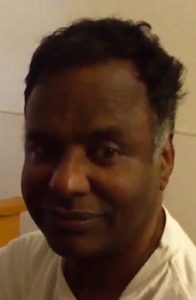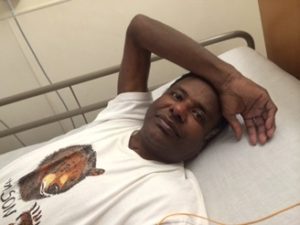By Hassan M. Abukar
A member of the Somali community of San Diego since the early 1990s, Osman Jinkismale Mohamed died of heart failure Sunday, Nov. 20, in San Diego. He was 59.
Jinkis, as his friends knew him, was popular among his fellow countrymen for his unbridled humor, affability, and technical savviness. He worked as a cab driver, but also moonlighted as a technician, wedding videographer, and an amateur mechanic.

Jinkis was born in Marka, a coastal town in southern Somalia, in 1957. He was given his father’s name “Jinkismale,” which means, “no one [among humans] is like him.” As a youngster, he enrolled in primary education, but his parents later pulled him out of school. Instead, he learned a few skills as he worked in various fields as a handy man.
In the 1970s, Jinkis unrelentingly pursued his dream of being an electrician. His determination paid off in 1978 when the American Embassy in Mogadishu hired him. He spoke no English, but he was proficient in his work and had strong people skills, which earned him the respect of his employer and colleagues.
In 1991, Jinkis, like thousands of Somalis, fled to Kenya because of the civil war. For a while, he spent time in the Utanga Refugee Camp near Mombasa. After a short period, he relocated to Nairobi where he applied to be settled in the United States. His previous work for the American Embassy came in handy and he was settled in San Diego in June 1993.
Wisecracking and charismatic, people listened to Jinkis when he spoke. He had an interesting accent—a blend of Markan and Benadiri dialects. I remember my nephew, Khalid Barre, then a teen, listening to Jinkis and watching him with rapt attention. I asked Khalid why he was looking at Jinkis in that way. Khalid replied, “Abti (uncle), he speaks Somali in a way that I have never heard.” Jinkis’ speech was unique and fun.
Somalis sought out Jinkis’ answers to various questions to elicit his humorous responses. One time, someone asked Jinkis how many breasts a she-camel has. Jinkis was not amused and said: “Why are you guys asking me about camels? I grew up in a coastal city. Ask me about fish.”
In another incident, Jinkis was driving along with three of his Somali co-workers in Poway, a suburb of San Diego, when a police officer stopped him for speeding. The officer asked Jinkis why he was speeding. Jinkis swiftly replied: “These guys were telling me my car is slow, and I wanted badly to show them how fast I can drive.” The officer laughed and said “That is the most honest answer I have ever heard from a motorist.”
Jinkis lived behind a Somali café popularly known as “Calaacal” (Whining) and would hang around the eatery. Tellingly, he once was heading to pray at a nearby mosque with another guy. The café was close to two Somali mosques; one a block away and predominantly Somali-run, the other was also overwhelmingly attended by Somalis, but Pakistanis ran it and it was two blocks away. When Jinkis was asked to pray at the closer mosque, he declined and said, “Ma rabo inaan tukado salaad afaara qabiil ah” (I do not want to offer a clannish prayer)”. He prayed instead in the mosque run by the Pakistanis. Still today, his friends remember his odd statement in amusement. It was a true reflection of the current tribal state of Somalis.
With his dark complexion and straight hair, Jinkis looked more like an Indian. Occasionally, he was bothered by customers who automatically assumed he was Indian. “I am a Somali,” he would curtly reply. However, his unique features were a blessing as he was able to cultivate more diverse clientele. He had an incredible work ethic as a cabbie because he sometimes worked seven days a week—from 4 a.m. to 4 p.m. There was just one hitch: His extremely hectic schedule proved to be detrimental to his health and well-being as he developed an acute form of hypertension.

In 2012, Jinkis suffered a stroke and went into deep coma that lasted for a year. Doctors told his friends that he would last only a week or two. They were wrong. He survived a few more years, and miraculously came out of coma, and slowly but surely started returning to his old self. The long coma, however, took a heavy toll and damaged his kidneys. He was on dialysis for years as he waited for a kidney transplant.
I met Jinkis in the early 1990s at the Department of Motor Vehicles. I helped him with his paperwork and interpreted for him. Since then, we forged a true and lasting friendship. He was kind, caring, dependable, genial, and a loyal friend, indeed, there were none like him. Many of the Somalis in San Diego will also miss him because he bent over backward to help his community. He was a positive soul. May God have mercy on him.
Hassan M. Abukar
—–
Hassan M. Abukar is a regular contributor to Wardheernews and the author of Mogadishu Memoir. He can be reached at [email protected].
We welcome the submission of all articles for possible publication on WardheerNews.com. WardheerNews will only consider articles sent exclusively. Please email your article today . Opinions expressed in this article are those of the author and do not necessarily reflect the views of WardheerNews.
WardheerNew’s tolerance platform is engaging with diversity of opinion, political ideology and self-expression. Tolerance is a necessary ingredient for creativity and civility.Tolerance fuels tenacity and audacity.
WardheerNews waxay tixgelin gaara siinaysaa maqaaladaha sida gaarka ah loogu soo diro ee aan lagu daabicin goobo kale. Maqaalkani wuxuu ka turjumayaa aragtida Qoraaga loomana fasiran karo tan WardheerNews.
Copyright © 2024 WardheerNews, All rights reserved


